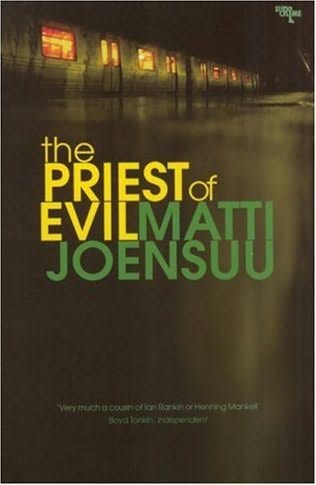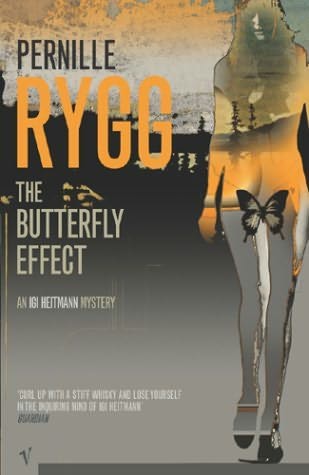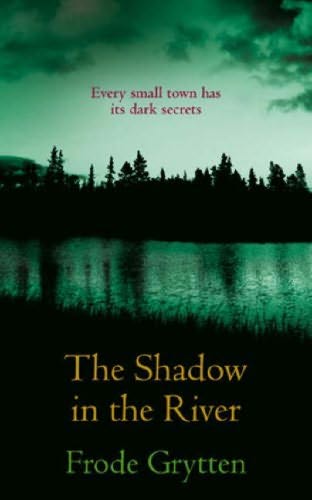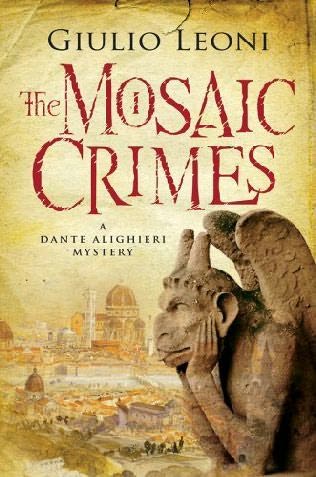I have to confess it is quite difficult now to stick to the plan of reading translated crime fiction. I am an active member of three library systems in London (Westminster, City, Merton) and an inactive member of three others (Brent, Islington, Camden), and I seem to have exhausted all the foreign crime available at these libraries. I have two choices: request books on transfer from other libraries; or start buying them.
Or I can start reading more Scandinavian fiction, of course. I’ve been studiously avoiding the Jungstedts and Nesbøs that remain in my unread list. I don’t want to tar the entire region with one brush, but – going by the ones I’ve read so far – there appears to be quite a lot of similarity both in plotting and character-development among the Nordic writers, and it’s difficult to find a distinctive voice.
 Difficult, but not impossible. Policeman novelist Matti Yrjänä Joensuu is a Finn with a vision. In his The Priest of Evil, he develops a peculiar mish-mash of new age religion, serial killings, deeply troubled adults and their disturbed relationships with appallingly cold and twisted parents, bullied children and their close friendships, mind control, and beneath it all, such aching sadness that it is not surprising Finland has one of the highest suicide rates in the world. A couple of fundamentalist preachers are accosting passersby at various Metro stops in Helsinki, and there appears to be a correlation between them and people falling onto the tracks. Were they pushed? Are they suicidal? The CCTVs show nothing suspicious. The investigating policeman is that rare bird in detective fiction – a man truly content in his marriage and with his little girls. Separate strands of the tale deal with a shaman who invokes an earth goddess and bleeds birds to death for his sacrifices, and a boy who strikes up a friendship with a girl who saves him from bullies. The boy’s mother is a virulently manipulative shrew, and his father is – like Joensuu – a man isolated from his colleagues because of his side career as a successful novelist. It’s obvious from the get-go who the killer is, but the goodness in the book is in the chase and in the details of a hidden Helsinki, and Joensuu’s fervent belief that the police, with a ringside view on society, is the front line in sensing evil in all its forms.
Difficult, but not impossible. Policeman novelist Matti Yrjänä Joensuu is a Finn with a vision. In his The Priest of Evil, he develops a peculiar mish-mash of new age religion, serial killings, deeply troubled adults and their disturbed relationships with appallingly cold and twisted parents, bullied children and their close friendships, mind control, and beneath it all, such aching sadness that it is not surprising Finland has one of the highest suicide rates in the world. A couple of fundamentalist preachers are accosting passersby at various Metro stops in Helsinki, and there appears to be a correlation between them and people falling onto the tracks. Were they pushed? Are they suicidal? The CCTVs show nothing suspicious. The investigating policeman is that rare bird in detective fiction – a man truly content in his marriage and with his little girls. Separate strands of the tale deal with a shaman who invokes an earth goddess and bleeds birds to death for his sacrifices, and a boy who strikes up a friendship with a girl who saves him from bullies. The boy’s mother is a virulently manipulative shrew, and his father is – like Joensuu – a man isolated from his colleagues because of his side career as a successful novelist. It’s obvious from the get-go who the killer is, but the goodness in the book is in the chase and in the details of a hidden Helsinki, and Joensuu’s fervent belief that the police, with a ringside view on society, is the front line in sensing evil in all its forms.
 And then we have Pernille Rygg’s The Butterfly Effect, which propagates the usual misunderstanding about chaos theory, flapping wings and hurricanes, but also comes up with yet another tale of child abuse. (What is with crime fiction and child abuse? It’s as though there is no other reason for murders on the planet. Oooh, either the victim or the murderer was abused as a kid. Oooh.) In this story set in a such a small dull town in Norway that living there must be living death, a girl’s body is found in the snow, riddled with bullets. The narrator, a sparky woman, determines that the dead girl had been her father’s last client; her father was a detective who had recently died in an accident. She is keen to find out if the deaths are in any way connected, and in the course of her slightly shambolic investigation, encounters corruption (what! in Norway? Impossible!) and bent psychologists. She herself is an interesting case: a psychology student complete with a troubled relation with her mother, and married to a gay man, to boot. Her suspects are equally eclectic: a founder of a Wicca-like cult, property developers, druggies. As with the other Scandinavian storytellers of recent fame, Rygg wants to analyse the effect of psychological abuse on children and its ramifications on wider society. Small closed societies like Norway probably have scars in their psyches because everything one does is ostensibly obvious to one’s neighbours; but this close scrutiny drives evil deeper into hiding, and the consequences are therefore more corrosive.
And then we have Pernille Rygg’s The Butterfly Effect, which propagates the usual misunderstanding about chaos theory, flapping wings and hurricanes, but also comes up with yet another tale of child abuse. (What is with crime fiction and child abuse? It’s as though there is no other reason for murders on the planet. Oooh, either the victim or the murderer was abused as a kid. Oooh.) In this story set in a such a small dull town in Norway that living there must be living death, a girl’s body is found in the snow, riddled with bullets. The narrator, a sparky woman, determines that the dead girl had been her father’s last client; her father was a detective who had recently died in an accident. She is keen to find out if the deaths are in any way connected, and in the course of her slightly shambolic investigation, encounters corruption (what! in Norway? Impossible!) and bent psychologists. She herself is an interesting case: a psychology student complete with a troubled relation with her mother, and married to a gay man, to boot. Her suspects are equally eclectic: a founder of a Wicca-like cult, property developers, druggies. As with the other Scandinavian storytellers of recent fame, Rygg wants to analyse the effect of psychological abuse on children and its ramifications on wider society. Small closed societies like Norway probably have scars in their psyches because everything one does is ostensibly obvious to one’s neighbours; but this close scrutiny drives evil deeper into hiding, and the consequences are therefore more corrosive.
Why, asked a Swedish acquaintance recently, are the Nordic writers so keen to show such a vicious side to their societies? ‘We are a peaceful, relatively crime-free people,’ he added. According to him, the sort of sociological analysis carried out by Henning Mankell and his younger followers are misplaced, and driven entirely by the desire to shock and to make money off that unsettledness. I don’t think this argument has much merit. Human behaviour is pretty much the same everywhere: paedophilia and serial killers are no less known in Scandinavia than in the US or India. But why is there such an outpouring of more or less similarly plotted novels coming out of Norway and Sweden and Denmark? This I am still unable to fathom.
 To save us from utter pessimism about Nordic noir, we have Frode Grytten, the third and last of our Scandinavians this month, who has penned The Shadow in the River, and who is quite, quite different from the rest I’ve read so far. He is a man of mordant wit, and he shows off his skills superbly in this tale of xenophobia in Odda, yet another depressingly small and moribund town in western Norway. Grytten is a journalist for the Bergens Tidende, a newspaper in neighbouring Bergen, and so is the protagonist of this book, Robert Bell, a disillusioned, semi-alcoholic man in love with his brother’s wife, a man whose career is not going anywhere, a man who is sinking into apathy but still manages to retain his biting satirical bent of mind. He investigates the death of a local man while public opinion begins to harden against immigrant Serbs with whom the victim had been seen to argue. His brother, a policeman in charge of the case, resents his interference, but surely the resentment stems from his suspicions of his wife’s relationship with Robert. This is black understated humour and poignant and moving.
To save us from utter pessimism about Nordic noir, we have Frode Grytten, the third and last of our Scandinavians this month, who has penned The Shadow in the River, and who is quite, quite different from the rest I’ve read so far. He is a man of mordant wit, and he shows off his skills superbly in this tale of xenophobia in Odda, yet another depressingly small and moribund town in western Norway. Grytten is a journalist for the Bergens Tidende, a newspaper in neighbouring Bergen, and so is the protagonist of this book, Robert Bell, a disillusioned, semi-alcoholic man in love with his brother’s wife, a man whose career is not going anywhere, a man who is sinking into apathy but still manages to retain his biting satirical bent of mind. He investigates the death of a local man while public opinion begins to harden against immigrant Serbs with whom the victim had been seen to argue. His brother, a policeman in charge of the case, resents his interference, but surely the resentment stems from his suspicions of his wife’s relationship with Robert. This is black understated humour and poignant and moving.
Even more poignant is Sebastien Japrisot’s heartfelt novel of the Great War, A Very Long Engagement. Five men sentenced for self-harm are executed in trenches of Verdun. Their relatives are told they died in action. The handicapped fiancee of one of the men, a girl from a privileged background and with a backbone of steel, then receives a letter which kindles her suspicion that there has been a cover-up. With immense fortitude, she begins an unofficial investigation into the matter. She casts her dragnet wide, antagonises public officials who do not want any muck raked up in the years after the war, raises the spectre of possible humiliation for the families of the dead men, stirs fond memories among mothers and sisters and wives, and follows the trail of suspicious deaths of men she finds out were involved in covering up the deaths of the soldiers. She finds out that the men’s sentences had been commuted, but vicious intermediaries had ensured the news wouldn’t reach them. She finds out that their deaths had been particularly heartless – they had been tossed into the no man’s land – when even the Germans had been horrified and ceased fire. There is much beauty to be savoured in this elegiac tale. Japrisot has vividly brought to life an era simultaneously heroic and corrupt, and the twist at the end is heart-aching, yet affirming. Excellent stuff.
relatives are told they died in action. The handicapped fiancee of one of the men, a girl from a privileged background and with a backbone of steel, then receives a letter which kindles her suspicion that there has been a cover-up. With immense fortitude, she begins an unofficial investigation into the matter. She casts her dragnet wide, antagonises public officials who do not want any muck raked up in the years after the war, raises the spectre of possible humiliation for the families of the dead men, stirs fond memories among mothers and sisters and wives, and follows the trail of suspicious deaths of men she finds out were involved in covering up the deaths of the soldiers. She finds out that the men’s sentences had been commuted, but vicious intermediaries had ensured the news wouldn’t reach them. She finds out that their deaths had been particularly heartless – they had been tossed into the no man’s land – when even the Germans had been horrified and ceased fire. There is much beauty to be savoured in this elegiac tale. Japrisot has vividly brought to life an era simultaneously heroic and corrupt, and the twist at the end is heart-aching, yet affirming. Excellent stuff.
 Finally, we have the frenetic The Third Heaven Conspiracy (also known as The Mosaic Crimes) by Giulio Leoni – a tale of Dante (in this case following the man himself, rather than serial killers killing in accordance to the deaths in his magnum opus). Dante is an investigator, a Prior, in Florence, and he attempts to solve the death of a mosaicist involved in the construction of the new cathedral in his city. Meanwhile, the Papacy is intruding into Florentine affairs, raising the hackles of the political elite of the city-state, and raising as well the spectre of renewed conflict between the supporters of the Holy Roman Emperor and those of the Pope. Dante himself is violently anti-Rome, having himself participated in the Guelph-Ghibelline wars of a few years before. As he digs deeper into the crime, he finds that it’s not just political intrigue that is involved, but also a battle for the soul of Florence, an intellectual conquest by means of supposedly secular educational institutions. Leoni tries to get into Dante’s psyche, using his published works as a mirror to his mind, and the attempt is – to my mind, at least – futile. There’s nothing about the story that needs Dante. It appears to be a conceit of lazy writers to use historical characters as detectives, and there is sufficient encouragement from casual readers for this sort of work. I’ve seen Newton and Longfellow dragooned into the role of detective, and now it’s Dante’s turn. Ho hum.
Finally, we have the frenetic The Third Heaven Conspiracy (also known as The Mosaic Crimes) by Giulio Leoni – a tale of Dante (in this case following the man himself, rather than serial killers killing in accordance to the deaths in his magnum opus). Dante is an investigator, a Prior, in Florence, and he attempts to solve the death of a mosaicist involved in the construction of the new cathedral in his city. Meanwhile, the Papacy is intruding into Florentine affairs, raising the hackles of the political elite of the city-state, and raising as well the spectre of renewed conflict between the supporters of the Holy Roman Emperor and those of the Pope. Dante himself is violently anti-Rome, having himself participated in the Guelph-Ghibelline wars of a few years before. As he digs deeper into the crime, he finds that it’s not just political intrigue that is involved, but also a battle for the soul of Florence, an intellectual conquest by means of supposedly secular educational institutions. Leoni tries to get into Dante’s psyche, using his published works as a mirror to his mind, and the attempt is – to my mind, at least – futile. There’s nothing about the story that needs Dante. It appears to be a conceit of lazy writers to use historical characters as detectives, and there is sufficient encouragement from casual readers for this sort of work. I’ve seen Newton and Longfellow dragooned into the role of detective, and now it’s Dante’s turn. Ho hum.

2 comments:
Great selection of books! I'll be on the lookout for them.
Hi, Who Are you ...
unable to recogonise get in touch with me....
Post a Comment